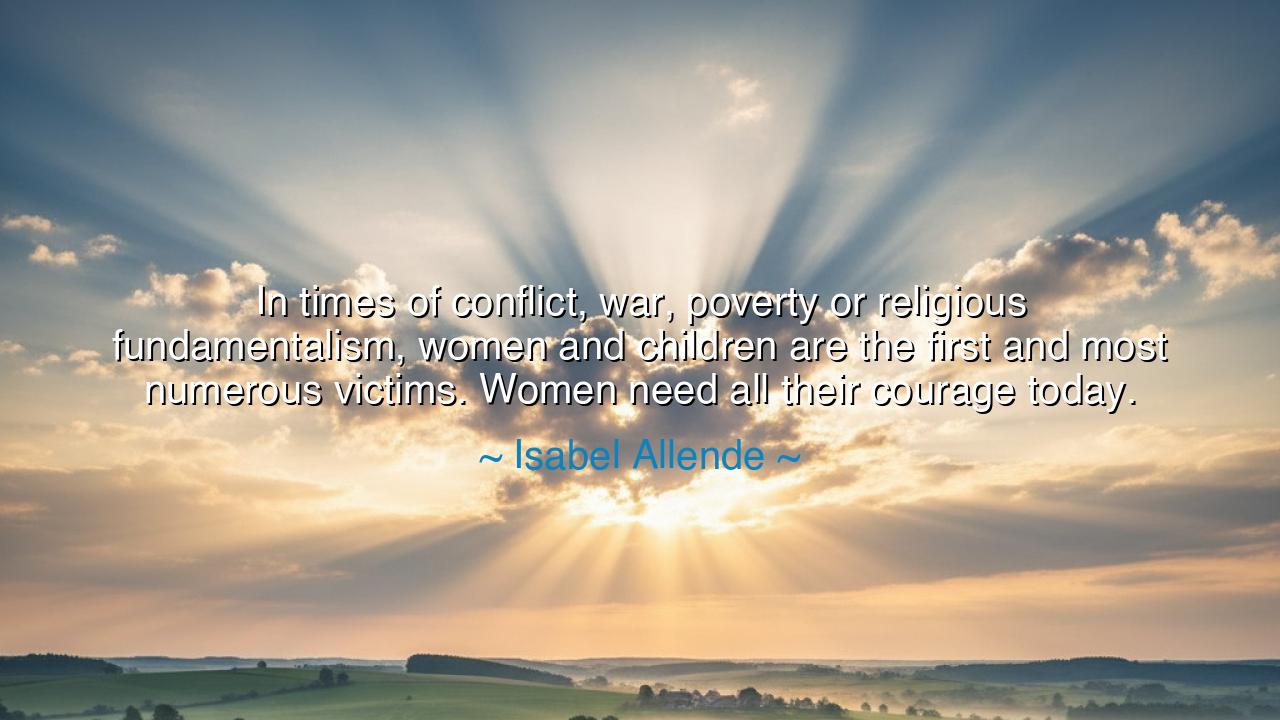
In times of conflict, war, poverty or religious fundamentalism
In times of conflict, war, poverty or religious fundamentalism, women and children are the first and most numerous victims. Women need all their courage today.






Isabel Allende, the great Chilean novelist and voice of feminine strength, once declared: “In times of conflict, war, poverty or religious fundamentalism, women and children are the first and most numerous victims. Women need all their courage today.” In this sentence, she distills a truth that echoes through every age — that when the world falls into chaos, it is the innocent who suffer most, and it is the women who bear the heaviest burdens. Her words are both lament and call to arms: a reminder that in every age of darkness, courage is not merely a virtue for women — it is their shield, their weapon, and their means of survival.
Allende’s insight was born of both history and personal experience. Having lived through the Chilean dictatorship, exile, and loss, she saw how quickly the structures of society crumble under tyranny and fear — and how, in the wreckage, it is women who rise silently to hold together what remains. She understood that when men march to war, when greed and zealotry tear at the world’s fabric, it is women who become the invisible warriors: mothers protecting children, widows rebuilding homes, daughters tending to the wounded and the hungry. Their courage does not shine in the fire of battle, but in the quiet endurance of suffering, in the unseen heroism of those who keep life alive amid ruin.
Throughout history, this truth has revealed itself again and again. In the ashes of World War II, when cities lay in rubble, it was women who filled the factories, the fields, the hospitals. They buried their dead, fed the living, and rebuilt the world with blistered hands and tear-streaked faces. In the long wars of liberation and resistance — from the Vietnamese mothers who carried food through jungles to the African women who hid rebels and taught children under trees — their courage was not merely emotional, but revolutionary. Allende’s words remind us that the world’s progress has always stood upon the backs of women who refused to break, even when no one saw them standing.
Yet her quote also pierces deeper, for it is not only about the past, but about today. She names four enemies: conflict, war, poverty, and religious fundamentalism — and in naming them, she names the enduring forms of oppression that still claim women’s freedom and safety. In many lands, women are stripped of education, silenced by dogma, or traded as possessions. In others, they live under subtler chains: poverty, exploitation, and fear of violence. And in every corner of the earth, even in the most modern societies, women are still asked to endure with grace what no one should be forced to bear. Thus, Allende’s cry that “women need all their courage today” is not metaphorical — it is literal. It is a call to spiritual defiance, to rise even when the world conspires to keep them low.
But let us not mistake her meaning — for Allende does not glorify suffering; she calls for empowerment. She believes courage is not only the endurance of pain, but the assertion of dignity. The courage she speaks of is the courage to demand justice, to tell one’s story, to educate one’s children, to break silence where silence kills. It is the courage of Malala Yousafzai, who, though shot for seeking education, rose again to speak for millions of girls denied the same right. It is the courage of the mothers of the Plaza de Mayo in Argentina, who stood before their oppressors demanding truth about their disappeared children. These women, unknown to history’s victors, became history’s conscience — proving that courage is not the absence of fear, but the refusal to let fear rule.
And yet, Allende’s message is not only for women — it is for all humanity. For a world that does not uplift its women condemns itself to decay. Every time a woman finds her voice, the world grows freer; every time she stands tall, humanity rises with her. Thus, her courage becomes the world’s courage. The true measure of civilization is not its wealth or armies, but the degree to which its women can walk unafraid, live unashamed, and dream unhindered. When women are denied dignity, all of humanity is diminished; when they are empowered, all of humanity flourishes.
So, my listener, take these words to heart: Courage is not given — it is cultivated. It grows in the soul that refuses to yield to despair. If you are a woman, know that your courage is sacred — it is the legacy of those who endured before you and the hope of those yet to come. If you are a man, stand beside such courage, honor it, and never demand that it be silent. For as Isabel Allende teaches, when the world is engulfed in the fires of conflict and fear, it is women’s courage — steadfast, patient, and fierce — that keeps the light of humanity from being extinguished. Let that courage burn within you, and through it, help rekindle the world.






AAdministratorAdministrator
Welcome, honored guests. Please leave a comment, we will respond soon